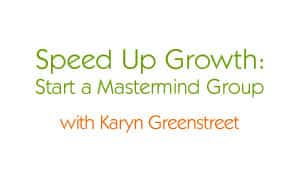What is a Mastermind Group? A Definition and tutorials
I get many requests about what a mastermind group actually is (and what it’s not). They have profoundly shaped members’ lives and many successfully navigate their professional and personal lives because of their participation in mastermind groups. I’ve facilitated mastermind groups for over 20 year, so let me share my definition (and ideas) with you…
What is a mastermind group exactly?
Mastermind groups meet on a regular basis and offer a combination of brainstorming, problem-solving and peer accountability to help members reach their goals more quickly. A mastermind group helps members achieve success by sharing best practices and creative solutions, shortening the learning curve for everyone. Members challenge each other to set strong goals — and more importantly, to accomplish those goals.
The mastermind group process focuses on one thing: helping you make the changes you want to make in your life. First, you create a goal, a vision for how things will be in the future. Then, with the help of the other members, you design a step-by-step plan to achieve your goals. The group helps you with creative ideas and wise decision-making. Then, as you begin to implement your plan, you bring both success stories and problems to the group. Success stories are applauded (loudly!), and problems are solved through peer brainstorming and collective, creative thinking.
The group requires commitment, confidentiality, and willingness to both give and receive advice and ideas. The group members support each other with total honesty, respect and compassion. Mastermind group members act as catalysts for growth, devil’s advocates and supportive colleagues. This is the essence and value of mastermind groups.
Mastermind group facilitators start and run these groups. Your job as the facilitator is to help the group to dive deeply into fruitful discussions, and work with your members to create success — as each member defines it. Facilitators are the secret to thriving mastermind groups. (I’ve seen plenty of groups fail because of poor leadership.)
Each meeting has a mastermind group agenda so that conversations stay highly-focused. The facilitator is tasked with making sure that conversations are deep and balanced, and that all mastermind group meeting agenda items are covered in the time allotted.
Want to learn how to start a mastermind group? Click here to get my free video tutorial on how to create a mastermind group of your own.
What a mastermind group is NOT
These days, many people call their event a “mastermind group,” or a “master class,” or simply a “mastermind event.” But it can be confusing when these terms are tossed around interchangeably because they’re not the same thing! Let’s clear up the confusion once and for all. Here’s my list of what a mastermind group is not.
- It’s not a class or workshop. While your group can vote to bring in guest speakers and teachers occasionally, the main focus of a mastermind group is the brainstorming and accountability support among the group members. Larger programs can include both education and masterminding, but they are two separate features. Sometimes people offer a workshop and call it a “mastermind” — but they mean “masterclass.”
- It’s not group coaching. Mastermind groups are about the members sharing with each other, not about the facilitator coaching individuals in a group setting. According to the Internation Coach Federation, coaches do not give advice. But in a mastermind group, everyone shares advice, ideas and feedback, including the facilitator. The key is to keep the conversation balanced among the members. Listen to my radio interview about mastermind groups and group coaching called “Beyond Group Coaching” with radio show host Christopher McAuliffe of The Coaching Show. Good news! If you are trained as a coach, you’ll use all those coaching skills as a mastermind group facilitator, plus all your teaching, mentoring and consulting skills, too.
- It’s not a mentoring group, where the members ask questions and the mentor or consultant provides all the answers while the group passively listens and learns. If the format of your group meetings is like a Q+A call, it’s not a mastermind group. In a mastermind group, both the facilitator and members mentor each other, and problem-solving and action planning are at the forefront.
- It’s not a networking group. While you may share leads and resources with each other, it is not the main focus of the meetings. However, through your connections with other members, you will find plenty of joint venture opportunities, lead sharing, and professional networking.
- Watch this short video tutorial where I discuss What’s the Difference between a Mastermind Group Facilitator, and a Coach or Consultant?
How to find a group
Many coaches, consultants and teachers run mastermind groups. I’ve seen them blossom all over the world! If you think a mastermind group is right for you, here are my 6 tips about how to find a mastermind group.
If you want more details, including how to vet a mastermind group to make sure it’s a good fit for you, download my free ebook, Finding Your Perfect Mastermind Group.
How to start a mastermind group
My entire blog is about how to start and run a mastermind group of your own. Here are some resources to get you started quickly:
- My free video tutorial, Speed Up Growth: How to Start a Mastermind Group
- 7 Creative Mastermind Group Agenda Ideas
- How to Frame a Hot Seat topic
Scalablity: What about these “mega” mastermind groups?
You’ll see lots of people running big group mentoring programs and calling them “mastermind groups.”
But are they really?
Here’s a four-part test to see if it’s really a true mastermind group, or if it’s simply a mentoring group:
- Do they offer individual Hot Seats for each member, where you get to talk about your challenges and your plans? Watch my video: How Often Should Members Get in the Hot Seat
- Does everyone in the group get to brainstorm together (sharing knowledge, insights and best practices), or is the focus on the mentor being the person with all the answers?
- Is there a function for individual accountability reporting? Is there someone on the staff who is holding your feet to the fire on a consistent basis?
- Do you meet with the same group of people, so that you get to know each other’s goals, problems and plans? Is the facilitator the same person for all meetings? This continuity is crucial and is a main component of a true mastermind group.
I have seen mega mastermind groups (200-500 members) that are true mastermind groups. They’re designed so that individuals can get personal attention and the brainstorming, problem-solving, and accountability power of the group. But it takes a lot of smart logistics (not to mention quite a few facilitators to run the Hot Seats), so not every large group program can call itself a true mastermind group.
Napoleon Hill’s definition
The concept of the “master mind alliance” was introduced by Napoleon Hill in his 1925 book, The Law of Success, and expanded upon in his 1937 book, Think And Grow Rich. While Napoleon Hill called it a “master mind alliance,” it’s been shortened and modernized to “mastermind group.” Mastermind groups have been around since the beginning of time. Even Benjamin Franklin belonged to such a group, which he called a Junto. But it was Napoleon Hill who explained it clearly and encouraged people to gather together in a structured, repeatable environment for the success of all.
Napoleon Hill wrote about the mastermind group principle as:
“The coordination of knowledge and effort of two or more people, who work toward a definite purpose, in the spirit of harmony.”
He continues…
“No two minds ever come together without thereby creating a third, invisible intangible force, which may be likened to a third mind [the master mind].”
What you’ll get from belonging to a mastermind group
In a mastermind group, the agenda belongs to the group and each person’s participation is crucial to the success of the group as a whole. Your mastermind partners give you feedback, help you brainstorm new possibilities and solutions to tricky problems. The facilitator sets up accountability structures that keep you focused and on track. You create a community of supportive colleagues who brainstorm together to move the members to new heights. You’ll gain tremendous insights that improve your business and personal life. Being a good mastermind group member creates massive value for you and everyone in your group.
Your mastermind group is like having an objective board of directors, a success team, and a peer advisory group — all rolled into one. Whether you find an existing mastermind group to join, or start a group of your own, you’ll love what this group process can help you accomplish. Learn about our classes at the Mastermind Group Academy, or sign up for my free video tutorial below.
Free Video Tutorial

Speed Up Growth: Start a Mastermind Group
Mastermind Group expert Karyn Greenstreet shares her secrets
The popularity of mastermind groups is growing worldwide, as people like you are creating success through brainstorming with your peers, solving problems, generating creative ideas, designing strong action plans, and holding each other accountable.
Learn how starting a mastermind group enhances your personal and professional life, leveraging your time and expanding your impact.
And remember: You can facilitate mastermind groups for your clients as an added value to them and a revenue stream for you.
You will learn:
- The 11 extraordinary benefits of mastermind groups
- Creative ideas for choosing a niche for your mastermind group
- The optimal number of people for your group (this one may surprise you!)
- Create a successful, enduring group by screening participants and eliminating duds
- Winning agendas for flourishing mastermind group meetings






